United States
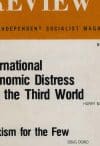
The political ineffectuality of Marxism in the United States is the consequence most importantly of the nature and history of U.S. capitalism. But also important in explaining this feebleness is what Marxists have and have not done, who they are, and their “style.” | more…

Stephanie J. Urdang was born in Cape Town, South Africa, into a white, Jewish family staunchly opposed to the apartheid regime. In 1967, at the age of twenty-three, no longer able to tolerate the grotesque iniquities and oppression of apartheid, she chose exile and emigrated to the United States. There she embraced feminism, met anti-apartheid and solidarity movement activists, and encountered a particularly American brand of racial injustice. Urdang also met African revolutionaries such as Amilcar Cabral, who would influence her return to Africa and her subsequent journalism. In 1974, she trekked through the liberated zones of Guinea-Bissau during its war of independence; in the 1980’s, she returned repeatedly to Mozambique and saw how South Africa was fomenting a civil war aimed to destroy the newly independent country. From the vantage point of her activism in the United States, and from her travels in Africa, Urdang tracked and wrote about the slow, inexorable demise of apartheid that led to South Africa’s first democratic elections, when she could finally return home. | more…
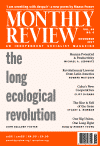
Over the last three decades, Monthly Review has stood out as a major source of ecosocialist analysis. This has been especially evident in recent months, with the publication by Monthly Review Press of three pathbreaking books: Kohei Saito, Karl Marx’s Ecosocialism: Capital, Nature, and the Unfinished Critique of Political Economy; Ian Angus, A Redder Shade of Green: Intersections of Science and Socialism; and Fred Magdoff and Chris Williams, Creating an Ecological Society: Toward a Revolutionary Transformation. | more…

From an ecological perspective, the Anthropocene marks the need for a more creative, constructive, and coevolutionary relation to the earth. In ecosocialist theory, this demands the reconstitution of society at large—over decades and centuries. However, given the threat to the earth as a place of human habitation this transformation requires immediate reversals in the regime of accumulation. | more…
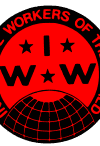
As the global economy grows increasingly unstable, undermining job security and the dignity of work, the IWW’s pioneering tactics, and perhaps even the union itself, may again be the means by which working people of all walks secure “the good things in life” while building “a new society within the shell of the old.” | more…
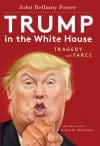
Remember that metaphor about the frog that slowly cooks to death in the pot of increasingly warm water? Leftists have used it for years to describe how people can accept dwindling health care, fading job opportunities, eroding racial and gender equality—as long as the loss occurs gradually. Now, with Donald Trump having slouched off to Washington, most of the mainstream media are working overtime to convince us that we can still stand the heat. Leave it to John Bellamy Foster, one of the world’s outstanding radical scholars, to expose Trump for who and what he is: a neo-fascist. Just at the boiling point, Foster offers us cool logic to comprehend the system that created Trump’s moral and political emergency—and to resist it. | more…
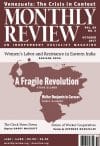
The groups fighting white supremacy in Charlottesville and elsewhere represent a cross-section of the U.S. left, from socialists to communists to anarchists. Together, they affirm that to combat the new right-wing resurgence, it is necessary to combat capitalism itself. | more…

Despite its inherent hazard of excess capacity, capitalism is distinguished by the vast, long-run expansion of its productive forces. How come? To answer this, we need to move from theory to history. | more…
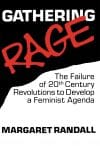
As the smoke clears from the collapse of revolutionary societies from Eurasia to Central America, analysts are searching for the crucial points of weakness that led to the failure of these “socialist experiments.” In Gathering Rage, writer, poet, and activist Margaret Randall describes how two of these revolutions, in Nicaragua and in Cuba, addressed or failed to address a feminist agenda.
Writing as both observer and participant, Randall vividly describes how, in each case, to varying degrees, and in different ways, women’s issues were gradually pushed aside. Combining anecdotes with analysis, she shows how distorted visions of liberation and shortcomings in practice left a legacy that
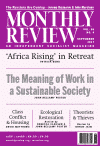
The publication last month of The Age of Monopoly Capital: The Selected Correspondence of Paul A. Baran and Paul M. Sweezy, 1949–1964, edited by Nicholas Baran and John Bellamy Foster, constitutes a landmark for Monthly Review Press. A historical document in itself, The Age of Monopoly Capital is not simply about the writing of their magnum opus, but also provides a window onto an entire era of American life. | more…
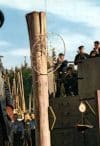
The present Russia panic follows an entire century of fearmongering and “threat inflation,” dating to the Russian Revolution, that has long served the interests of the U.S. military-industrial complex and security state. It has had little to do with either Russian or American realities, which have been consistently distorted. | more…
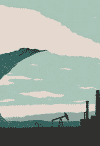
Scholars, scientists, politicians, and others are moved to write about climate change for a variety of reasons, including scientific advance, political influence, and public education. For the late Del Weston, the reason was clearly love—for people and for the earth. | more…











